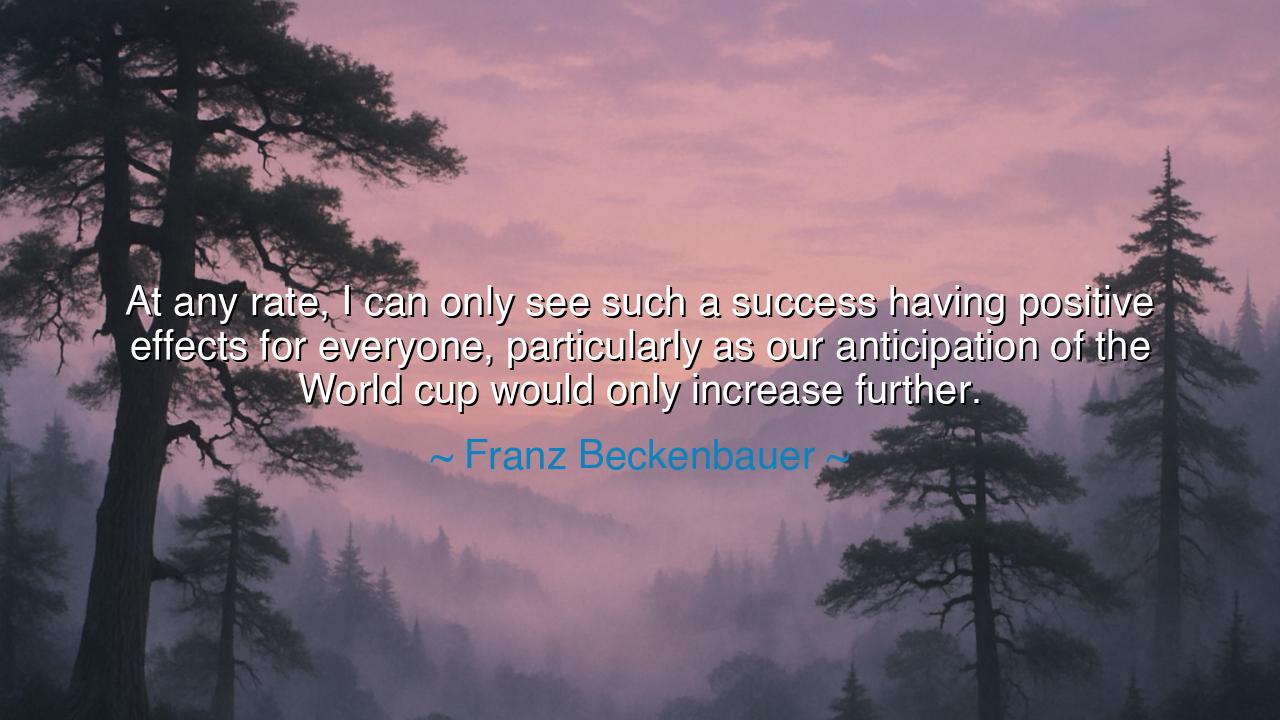
At any rate, I can only see such a success having positive
At any rate, I can only see such a success having positive effects for everyone, particularly as our anticipation of the World cup would only increase further.






Hear the words of Franz Beckenbauer, the “Kaiser” of football, who declared: “At any rate, I can only see such a success having positive effects for everyone, particularly as our anticipation of the World Cup would only increase further.” These words, born of a master who knew victory and defeat alike, are not merely about sport, but about the power of collective triumph. For he speaks of success not as a treasure for one man, nor even for one team alone, but as a fountain that refreshes whole nations, inspiring the hearts of all who share in it.
To achieve success in the realm of football—or in any endeavor that stirs the blood of many—is to ignite a flame of unity. Such victories do not belong solely to the players upon the field, but to the millions who watch, who cheer, who weep, and who believe. This is why Beckenbauer proclaims that its effects are positive for everyone, for the spirit of triumph transcends the boundary of the stadium and floods into the streets, the homes, the lives of those who draw strength from it.
Consider the story of Germany’s 1954 World Cup victory, known forever as “The Miracle of Bern.” In that moment, a nation still broken by war and shame found in football a symbol of rebirth. Their triumph over mighty Hungary was more than a win—it was a balm upon wounds that seemed unhealable, a reminder that dignity could be restored, that pride could return. The anticipation of the World Cup became not only about sport but about life itself, about believing once again in the possibility of renewal.
So too in 1995, when South Africa hosted and won the Rugby World Cup. Nelson Mandela, clad in the jersey of the Springboks, lifted the trophy not only as a symbol of victory but as a bridge between divided peoples. That success carried positive effects that no scoreboard could measure—it became a beacon of reconciliation, a step toward healing a fractured nation. The anticipation and joy of sport became the seedbed of unity.
The meaning of Beckenbauer’s words is thus: success is not merely a private possession, but a shared inheritance when achieved in the name of a team, a nation, or a cause. The glory of one moment can ripple outward, raising spirits, healing divisions, and giving people something to look forward to. The anticipation of the future grows brighter, for past victories remind us of what is possible, and of what we may yet achieve together.
The lesson for us is clear: do not hoard your triumphs, nor see them as selfish gains. Recognize that when your efforts succeed, they can uplift others too—family, friends, community, even nations. Let your victories be a spark that ignites hope in others, and let your successes be remembered not only for what they gave you, but for how they strengthened those around you.
Practical wisdom calls us to three acts. First, when you achieve something, share the joy—celebrate in a way that includes others. Second, let your victories inspire future efforts, for each success builds the courage to dream of greater things. Third, look upon the triumphs of others not with envy, but with gratitude, for their light also illuminates your path, increasing the collective anticipation of what lies ahead.
So let it be remembered: in football, as in life, success has the power to unite, to heal, and to prepare the way for greater victories yet to come. Franz Beckenbauer’s words are not only for players and fans, but for all who labor toward triumphs that can uplift many. Let us embrace this truth: that every shared victory multiplies joy, deepens hope, and carries with it positive effects that ripple through the world, far beyond the field where it was first won.






TQ24 Tran Quang
This quote reflects the optimism that defines great leaders in sports. I appreciate the confidence that success can lead to broader positive outcomes — from fan morale to economic boosts. However, I wonder if success always has purely positive effects. Could it also breed overconfidence or unrealistic expectations for future tournaments? It’s interesting how triumphs can both inspire and pressure teams at the same time.
BDDAVID BEC DE
There’s something very genuine about the optimism in this statement. I agree that success can generate a sense of momentum and shared excitement, especially in a global event like the World Cup. But do you think such positivity can ever become complacency? Sometimes too much celebration before the real challenge begins can distract teams from staying focused on performance and preparation.
Aanhngan2010
Beckenbauer’s comment reminds me how sports often reflect broader cultural emotions. The idea that collective success benefits everyone feels uplifting, but it also makes me think about inclusivity. What about people who don’t care about football or feel excluded from the hype? Can national enthusiasm still be ‘positive for everyone,’ or does it risk alienating those who don’t share the passion?
CTNguyen Cao Thien
I like how this perspective emphasizes the ripple effect of success. It’s not just about winning; it’s about how victories can inspire hope and anticipation. Still, I’m curious — does this kind of national optimism put too much pressure on athletes? Sometimes the expectations surrounding major events like the World Cup can become overwhelming. How do players balance that emotional weight with performance?
UGUser Google
This statement really captures the unifying power of sports. Success in football often goes beyond the game itself — it lifts the spirits of an entire nation. I find it fascinating how collective pride and excitement can strengthen social bonds. But I wonder, do such moments of unity last beyond the tournament? Or do they fade once the competition ends and everyday life resumes?